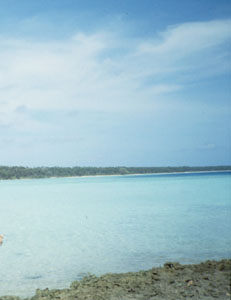It’s hard for me to read a book without changing behavior based on what I learned. As a practical person, I ask myself, What should I do differently because of what I learned? What are my own action items now that my understanding has expanded by reading The Comforting Whirlwind by Bill McKibben?
Witnessing the Glory Around Us
What part should we play? … Luckily, of course, there are whole huge categories of activity for which reason is utterly suited and which do not also spell destruction for the rest of the ecosystem. Witnessing the glory around us — that is a role no other creature can play (McKibben 67).
One action item is to make time to regularly spend time in nature.
- Weekly, I can keep my commitment to spend Sabbath afternoons at Fernwood Botanical Garden, watching the new flowers grow, being silent in the spring sunshine, listening to the rustling of the leaves and the chirping of the birds.
- Annually, we can plan our vacation trips to include a healthy dose of the outdoor wildness. To feel the wonder of creation and our smallness.
 When I was a student missionary on Arno in the Marshall Islands, I loved to walk down the beach past the village. (See picture.) Sitting on the beach for my morning worship, the silence was immense. The ocean stretching infinitely past the horizon. Pondering nature puts all our problems into perspective. The scene calls us to humility and joy (McKibben 47).
When I was a student missionary on Arno in the Marshall Islands, I loved to walk down the beach past the village. (See picture.) Sitting on the beach for my morning worship, the silence was immense. The ocean stretching infinitely past the horizon. Pondering nature puts all our problems into perspective. The scene calls us to humility and joy (McKibben 47).
Caring for the Environment
We already do several things to help the environment: recycling, growing some of my own food, eating vegetarian, eating as natural as possible with as little packaging as possible, buying locally grown fresh farm veggies in the summer, driving a hybrid car, purchasing environment friendly hand soap and shampoo to name a few.
But of course there is much more we could do. This list of 50 Ways to Save the Environment is a list to grow by. I could improve in the yard and office areas.
Conscious Self Restraint
The secret weapon of environmental change and of social justice must be this — living with simple elegance is more pleasurable than living caught in the middle of our consumer culture (McKibben, 68).
Of these gifts [joy, home, service, etc], the most unique and the most paradoxical is the ability to restrain ourselves. Conscious self-restraint belongs to no other creature, and for us it is the hardest of all tasks, both as individuals and as societies (McKibben, 69).
I choose restraint. I choose to be content with what I have. I choose to give to others. I choose to resist and reject commercialism as often as possible. Instead, I will walk in the sunshine, the glory of God revealed in the world, and focus on His greatness and love always.
 Here are some articles on Faith in the Workplace that I want to keep & refer back to.
Here are some articles on Faith in the Workplace that I want to keep & refer back to. When I was a student missionary on Arno in the Marshall Islands, I loved to walk down the beach past the village. (See picture.) Sitting on the beach for my morning worship, the silence was immense. The ocean stretching infinitely past the horizon. Pondering nature puts all our problems into perspective. The scene calls us to humility and joy (McKibben 47).
When I was a student missionary on Arno in the Marshall Islands, I loved to walk down the beach past the village. (See picture.) Sitting on the beach for my morning worship, the silence was immense. The ocean stretching infinitely past the horizon. Pondering nature puts all our problems into perspective. The scene calls us to humility and joy (McKibben 47).
 Thinking that we don’t need to care for the earth because it’s going to be destroyed anyway is like not washing the dishes because they are going to get dirty again. It doesn’t matter if as one person we can’t change the course of a materialistic society. We can and should do our part. It doesn’t matter what we know about prophecy, about the end of time. It isn’t futile to care for the earth now because it will be destroyed later. We should obey God and take care of His creation because He commanded us to. Just like we obey the 10 Commandments because He said to; we should care for His creation too. Not just care for it; but take time to immerse ourselves in the natural grandeur that reminds us of our smallness and God’s greatness.
Thinking that we don’t need to care for the earth because it’s going to be destroyed anyway is like not washing the dishes because they are going to get dirty again. It doesn’t matter if as one person we can’t change the course of a materialistic society. We can and should do our part. It doesn’t matter what we know about prophecy, about the end of time. It isn’t futile to care for the earth now because it will be destroyed later. We should obey God and take care of His creation because He commanded us to. Just like we obey the 10 Commandments because He said to; we should care for His creation too. Not just care for it; but take time to immerse ourselves in the natural grandeur that reminds us of our smallness and God’s greatness.